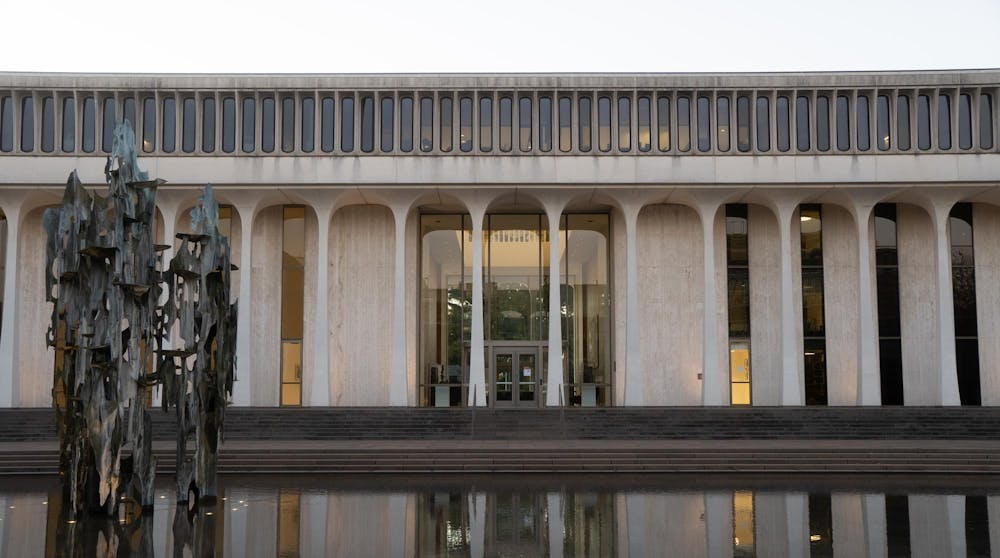The Undergraduate Student Government (USG) discussed establishing the Civil Liberties Working Group as a committee, creating a new working group for student-administrator transparency, and reviewing the status of an AI in academics survey led by the Academic Life Working Group at its weekly meeting on Sunday.
One of the co-chairs of the Civil Liberties working group, Ila Prabhuram ’27, spoke alongside deputy project manager Marvel Roth ’28 to explain why the transition from working group to standing committee would be useful.
“We think it’s best to standardize and formalize the role of the work that we do in the focus on civil liberties,” Prabhuram said. “It’s becoming more and more pertinent to focus on this as we see what’s happening right now in the world.”
Among a handful of questions addressing language in the resolution, treasurer Quentin Colón Roosevelt ’27 raised the potential issue of future members of the Senate not having sufficient interest in leading the committee if it were to become a core one.
“I’m not so sure about the notion of [the committee] being de-politicized just by having the president appoint two members. What if there are no members who are interested?” asked Colón Roosevelt. “There’s a mandate for senators to serve on a committee that they might not actually be interested in.”
“If no one wants to be chair, then that’s a larger problem we need to look at,” Roth responded. With that, the Senate voted and passed the resolution unanimously.
The USG DEI Committee will be launching a new campaign promoting transparency and increased communication between the University administration and students under the leadership of committee chair Brian Mhando ’26.
The goal of this working group is to address a lack of “transparency between admin and the general student body,” according to Mhando, who also criticized the process behind the administration’s recent student-facing decisions, such as the one regarding dining plan changes. Additionally, he ventured that students did not feel comfortable going to USG “as a place to talk about certain issues.”

“Whether that’s campus expansion, whether that’s any issue you name, whether it has to do with diversity, inclusion, or mental health, or whatever, not many people see USG as a place to go for authorization,” Mhando said.
The solution, Mhando believes, is creating spaces where students can openly discuss issues with administrators — a long-term solution he hopes will be sustainable after his term.
“I devised a plan where we gather students in multiple different venue spaces to one meeting, and we discuss a certain theme with administrators, to not only hear input from students [and] the concerns they have about certain things going on campus, but also hear from administrators and get administrators the chance to really work through issues students have regarding certain things,” Mhando said.
The group established through this plan will collaborate with the University Office of Diversity and Inclusion working group, composed of faculty and administrators.

There is also a pilot working group focusing on campus expansion. Members of the group include Ian Deas, representing the Office of the Dean of Undergraduate Students; Karen Richardson, dean of admission and financial aid; representatives from the Emma Bloomberg Center for Access and Opportunity; and student representatives, including USG President Enzo Kho ’26 and members of various affinity groups. The first meeting of the group will be in early December, according to Mhando.
The meeting concluded with a presentation from U-Councilor Shria Ajay ’27 regarding a new survey about AI use in academics that will be sent out in the spring of this academic year from the Academic Life working group. Ajay said that she and the working group are hoping to take the responses and use them to make policy recommendations regarding AI.
This semester, the group compiled a list of 36 survey questions, primarily multiple choice, which they claimed should take around 12 minutes. While creating the survey, the group consulted with various sources including the McGraw Center, Princeton Survey Research Center, and the University’s Institutional Review Board.
“I have a meeting on Tuesday with the Dean of the College … which will be the ultimate overview of what the surveys are going to look like,” Ajay said.
Ajay and the working group have already been considering the question “What are the ways to use AI for your schoolwork?” and she will be finalizing the current draft of the survey in the coming weeks, with a release slated for the spring and a two-month data collection period.
USG Meetings are open for all students to attend and are held on Sundays from 5–6 p.m. in Robertson Hall 016. Elections for new USG members are currently ongoing.
Luke Grippo is an assistant News editor for the ‘Prince.’ He is from South Jersey and typically covers University and town politics, on a national, regional, and local scale. He can be reached at lg5452[at]princeton.edu.
Haeon Lee is a News contributor for the ‘Prince.’ She is from Brooklyn, NY and can be reached at hl1389@princeton.edu.
Please send any corrections to corrections[at]dailyprincetonian.com.








